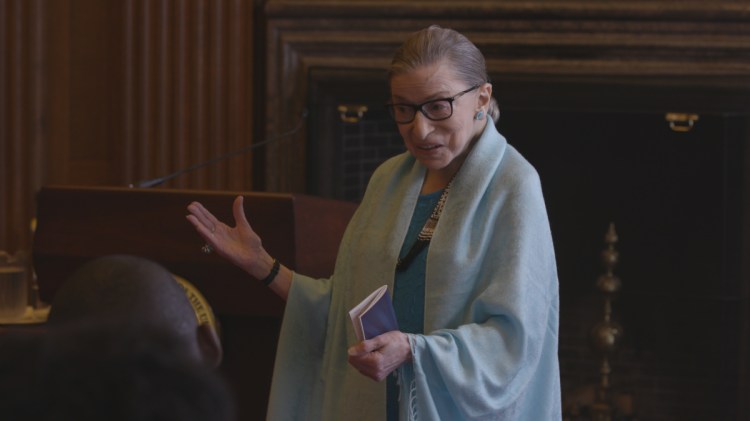There she is wending her way through throngs of adoring millennial women, freshwomen and grads from Harvard, Princeton, Yale and every community college in America. There are women of all shapes, sizes and colors, many in various RBG T-shirts, come to welcome a tiny, 85-year-old painfully thin apparition in black pants and a sharp black-and-white knee length jacket.
Ladies and gentlemen, Julie Cohen and Betsy West, co-directors of the documentary “RBG,” along with writer John Fink present Supreme Court Justice Ruth Bader Ginsburg, implore you to stand and welcome the tiny Jewish wall that stands between occupied America and the tsunami of right wing Republican vitriol.
Cohen and West’s documentary is the story of one of America’s most famous women, a little girl from Brooklyn, who has never recorded a ballad, danced halftime at the Super Bowl, made a blockbuster movie, married a prince or been involved in a scandal, and yet is lovingly parodied by the superb Kate McKinnon on Saturday Night Live to screams, shouts and applause by the mostly young audience.
Ruth Bader Ginsburg is indeed a rock star, a super hero without a cape, and I’m sure her face adorns dart boards in GOP rec rooms.
Cohen and West mostly give us the RBG we already know well, a brilliant woman of law, known for fighting for gender equality for decades.
We see as well, a moving photo album of the schoolgirl Ruth, with asides from a few of her old school mates who fill in a lot of the details of the early workaholic we came to know in later years.
Yes, we see her at the opera, lips apart, eyes glazed with the sweet sounds of Mozart, Verdi, Rossini and Puccini soaking into her heart.
And yes, we see the cliché shot of her nodding off the State of the Union speech, surrounded by her black robed partners struggling to stay awake. An opera fan myself, I’m sure she was being lulled to sleep by the sounds of Bellini’s music.
But it’s not all adoration, bouquets of roses and soft chocolates; it starts with the usual cascade of voices from the Far Right who fill the air, tweets and sticks and stones. Ignore them.
Cohen and West weave a richly detailed tapestery of the second woman to be confirmed to the court (after Sandra Day O’Connor), but bring along a Valentine scrapbook full of stories of her marriage to Marty Ginsburg, a young lawyer, now deceased who came to be known as the “smartest tax lawyer in Manhattan.”
Marty, a devout husband who died with a nose bruised by the grindstone of big city law, came close to an earlier death with a serious bout with cancer. But mostly it’s about Ruth, who kept him afloat, providing daily injections of hope and praise, who after finishing her day’s work would make lists and prepare notes so that he could get his degrees. This, from a girl who graduated from high school at 15.
It’s a love story, this tale of Marty and Ruth, two Jewish kids from Brooklyn. It’s that simple. Yes, she was all of those things they write about her, but at the core of her, she was the nice, sweet girl from a family who gently pushed her aside so her brother, the “man of the family” could attend college first. I doubt that this woman, who later devoted her life and career to gender equality, ever quite forgot that.
For myself, I see a fragile pinnacle of courage and justice, holding a candle against a hard cold wind of injustice that has blown up from the dark corners of the Far Right. I don’t worry about Ruth. I’ve felt the cold winds of her Brooklyn.
I remember now my favorite quote from the great Irish writer Samuel Beckett who wrote — “Perhaps my best years are gone, when there was a chance of happiness. But I wouldn’t want them back. Not with the fire in me now. No, I wouldn’t want them back.”
J.P. Devine, of Waterville, is a former stage and film actor.
Send questions/comments to the editors.




Success. Please wait for the page to reload. If the page does not reload within 5 seconds, please refresh the page.
Enter your email and password to access comments.
Hi, to comment on stories you must . This profile is in addition to your subscription and website login.
Already have a commenting profile? .
Invalid username/password.
Please check your email to confirm and complete your registration.
Only subscribers are eligible to post comments. Please subscribe or login first for digital access. Here’s why.
Use the form below to reset your password. When you've submitted your account email, we will send an email with a reset code.